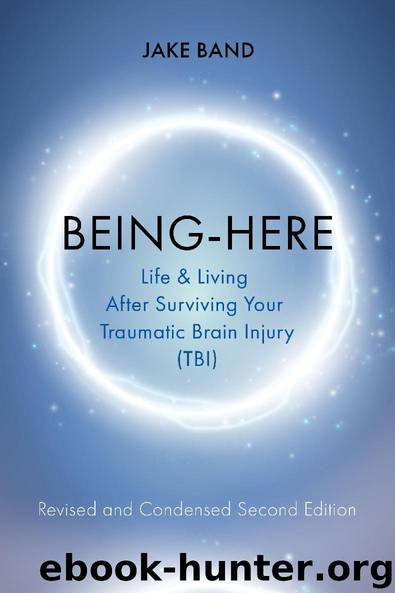Being-Here: Life & Living After Surviving Your Traumatic Brain Injury (TBI) by Jake Band

Author:Jake Band
Language: eng
Format: epub
Publisher: Atlantic Publishing Group, Inc.
Published: 2018-12-17T18:42:15+00:00
Chapter Four
Graduate School
When moving for graduate school, we stopped right before entering the state. I got out of our vehicle and smoked my last ciga rette.
My First Semester of Graduate School
Despite my initial and repeated rejection of the idea, I was initially talked into taking a full class load. The professor I met at my interview continued to pressure me with non-stop reminders and the so-called benefits, along with an increasing the amount of financial aid offered. My choice to go along with his badgering me to take a full load was partly because he claimed to have knowledge treating those who have survived a TBI, and partly because of the trust of professors that grew in me from my positive experiences at CC and Holy Ghost Unive rsity.
Intro to Counseling
Intro to Counseling was an interesting course. We began with lectures about counseling ethics, responsibilities, the dos and don’ts, the say and never says, and other Rehabilitation Department (RD) fundamentals in counselor and “client” relationships. Eventually, the students began meeting weekly for out of class counselor/“client” role-playing. Small group meetings happened next to review our role-playing counseling. This was all happening while there were more classes and lectures. Role-playing was ridiculous with my classmates, or “clients,” trying to act like he/she was a stereotype, a helpless and desperate survivor of a TBI.
In my mind, giving my classmates any suggestions on how a survivor acts would not only be impossible, but would also be contributing to the huge world of stereotypes and assumptions about those who survive a TBI, which would not help anybody. Between my classmates’ poor role-playing and my hesitance to “give hints” about how to act when role playing a survivor, there did not seem to be one moment when I played the counselor in a “client”/ counselor role playing that felt benef icial.
Based on what was learned in previous psychology classes and my perception of what kind of feelings, thoughts, limitations, change in life, and any other aspect of existing with the particular disability it was my role to “play,” I became an individual with whatever disability my classmate wanted to be “counseling”. All but one classmate said my playing of the “client” seemed like the most authentic, and thanked me for the quality of “client” I was trying to be for them.
Medical Aspects of a Disability
Medical Aspects of Disability was the most difficult class of the first semester of RD’s program. The course was made of a medical/biological cause and effect orientation, with a symptom and treatment summary of many disabilities. Grading was through periodical curved-graded quizzes. And the professor used the same quizzes every semester. All disabilities covered in the Med Aspects course had a guest speaker, who survived, was living through, and/or had overcome the disab ility.
Jay Revere’s advice about studying and hooking the different parts of a class subject to things already in my long-term memory did not seem to work. There were not enough places in my consciousness that could be used as hooks for all the information.
Download
This site does not store any files on its server. We only index and link to content provided by other sites. Please contact the content providers to delete copyright contents if any and email us, we'll remove relevant links or contents immediately.
When Breath Becomes Air by Paul Kalanithi(7284)
Why We Sleep: Unlocking the Power of Sleep and Dreams by Matthew Walker(5674)
Paper Towns by Green John(4183)
The Immortal Life of Henrietta Lacks by Rebecca Skloot(3838)
The Sports Rules Book by Human Kinetics(3605)
Dynamic Alignment Through Imagery by Eric Franklin(3507)
ACSM's Complete Guide to Fitness & Health by ACSM(3477)
Kaplan MCAT Organic Chemistry Review: Created for MCAT 2015 (Kaplan Test Prep) by Kaplan(3432)
Introduction to Kinesiology by Shirl J. Hoffman(3309)
Livewired by David Eagleman(3145)
The River of Consciousness by Oliver Sacks(3004)
Alchemy and Alchemists by C. J. S. Thompson(2920)
The Death of the Heart by Elizabeth Bowen(2916)
Descartes' Error by Antonio Damasio(2753)
Bad Pharma by Ben Goldacre(2738)
The Gene: An Intimate History by Siddhartha Mukherjee(2504)
Kaplan MCAT Behavioral Sciences Review: Created for MCAT 2015 (Kaplan Test Prep) by Kaplan(2496)
The Fate of Rome: Climate, Disease, and the End of an Empire (The Princeton History of the Ancient World) by Kyle Harper(2447)
The Emperor of All Maladies: A Biography of Cancer by Siddhartha Mukherjee(2441)
